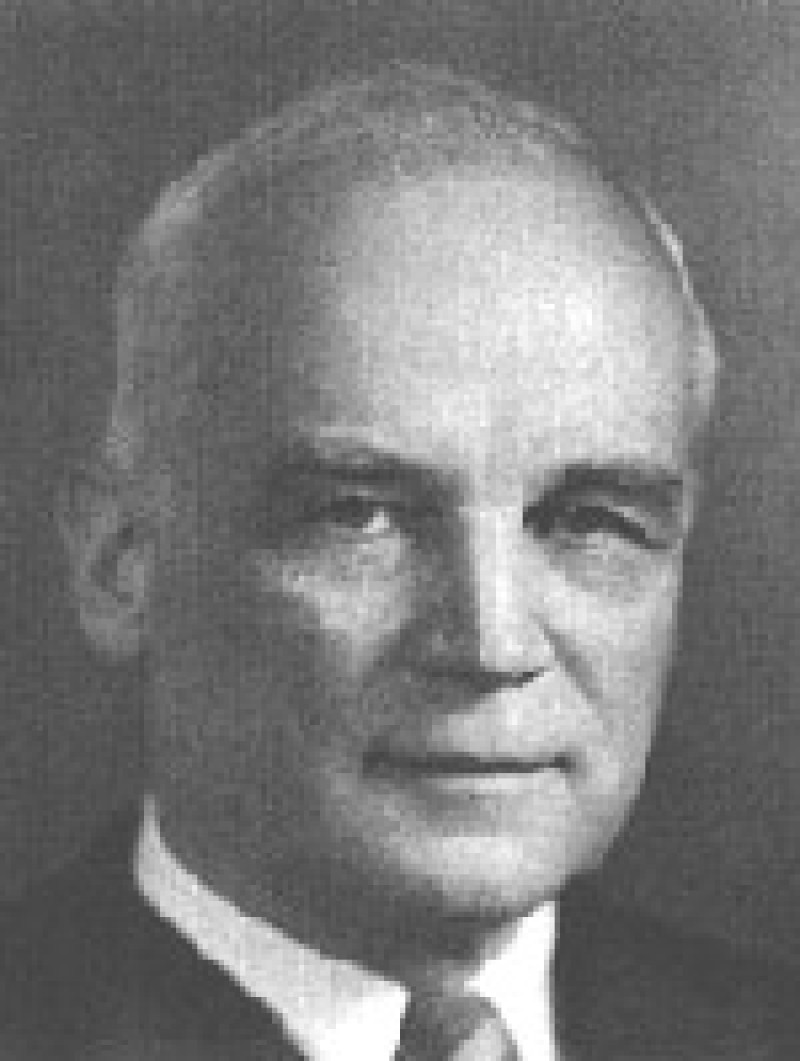Harold Hitz Burton (June 22, 1888 - Oct. 28, 1964)
Although Harold Hitz Burton can in no way be considered a justice of major influence, he nonetheless played an important role in moving the court from its New Deal emphasis on upholding federal powers at the expense of the states and individuals, to the Warren court's focus on a more tempered federal reach and a larger sphere of individual rights. He was consistent without being doctrinaire, meticulous, and an indefatigable worker.
Burton was born in Jamaica Plain, Mass. He attended Bowdoin College, from which he received an A.B. summa cum laude in 1909. He matriculated that fall at Harvard Law School and graduated with an LL.B in 1912.
After two years of practice in Cleveland, Burton followed his wife's uncle to Salt Lake City to practice law in the legal department of Utah Power and Light Company, and later at Utah Light and Traction Company. He subsequently practiced with the Idaho Power Company and Boise Valley Traction Company, both in Boise.
When the United States entered World War I, Burton joined the infantry. He was commissioned a first lieutenant and sent to France, where he saw battle and was later the operations officer of his regiment. Finishing the war as a captain, he resigned his commission in 1919 and returned to Cleveland, where he resumed practicing corporate law with Day, Day & Wilkin.
In 1925 Burton became a partner in his own firm, Cull, Burton & Laughlin. He combined his general business practice with a spate of civic activities and a stint as a part-time lecturer in corporation law at Western Reserve University Law School (now Case Western Reserve University). Burton, a Republican, designed all these activities to prepare himself for political office. In 1927 he was elected to the East Cleveland Board of Education. He won a seat in the Ohio House of Representatives in 1928 and served from January until October 1929. Then he became the Cleveland director of law, serving until 1932. During that tenure, he also served for brief periods as acting city manager and acting mayor.
From 1932 to 1935 Burton practiced law with Andrews, Hadden & Burton in Cleveland, while engaging himself with current political issues. In 1935 he was elected mayor of Cleveland, the office he held until his election to the U.S. Senate in November 1940. President Harry S. Truman got the chance to make his first Supreme Court appointment when Justice Owen Roberts resigned at the close of the court's term in July 1945. On Sept. 18, 1945, Truman submitted Burton's name to the Senate, which confirmed him unanimously the next day without holding hearings and ended up serving 13 full terms on the court.
Ideologically, Burton came to the court with rather mature views in most areas, and he did not shift his position on major issues over the course of his tenure. In commercial law cases involving federal action, Burton occasionally supported the government's position but usually voted against any expansion of government's powers. In purely private-law areas, he often voted to circumscribe the rights of labor unions and took a narrow view of the antitrust law's reach.
By June 1957 Burton had begun to exhibit the symptoms of Parkinson's disease. During the October 1957 term (which ran through June 1958) his physical condition became progressively worse, and after the term his physician advised him to resign. Because of the case involving desegregation of schools in Little Rock, Arkansas, Burton felt unwilling to resign immediately. He stayed on the court into the beginning of the October 1958 term, although he had privately advised President Dwight D. Eisenhower during the summer that he would resign as soon as the court's business permitted. He finally submitted his resignation effective Oct. 13, 1958. Potter Stewart was nominated and quickly confirmed to replace him.
In retirement Burton sat by designation in the U.S. Court of Appeals for the District of Columbia Circuit through four years. Finally he succumbed to Parkinson's disease and died in George Washington Hospital in Washington, D.C.
Biography of Harold Hitz Burton (June 22, 1888 - Oct. 28, 1964)
Citation: Eric A. Chiappinelli. "Burton, Harold Hitz"; http://www.anb.org/articles/11/11-00125.html; American National Biography Online Feb. 2000. Access Date: Mon Nov 10 10:07:52 2003 Copyright © 2000 American Council of Learned Societies. Published by Oxford University Press. All rights reserved.
Portrait of Harold H. Burton - Office of the Curator, Supreme Court of the United States.

